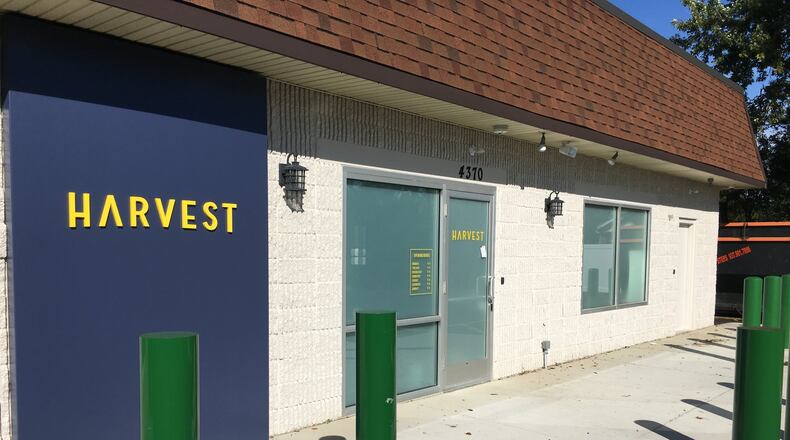Of the 647 people surveyed, most had qualifying medical conditions and used marijuana for their ailments. Key findings include 67% reported being either very dissatisfied or somewhat dissatisfied with the program; only 45% had received the required doctor’s recommendation; and 87 percent preferred buying marijuana from a legal dispensary if the product is priced similar to what’s on the street.
RELATED: Dayton medical marijuana outlet to be open ‘soon’
Ohio’s medical marijuana control program is “overregulated in the extreme” and is designed in a way that businesses have “100 small problems” that make it difficult to be in compliance, said Dennis Cauchon, founder of Harm Reduction Ohio, a nonprofit organization created in response to the state’s opiod crisis.
“The Ohio regulated, legal marijuana market cannot compete with the highly sophisticated illegal marijuana market,” Cauchon said. “The problem ultimately is the regulations. The regulations are the worst in the country in Ohio.”
While the program is in its infancy and satisfaction surveys are likely to improve, the stage is set for either reforms or a new ballot initiative in the future, according to Doug Berman, professor at OSU’s Moritz College of Law.
“We’ve never had this experience of going from a robust black market to a tightly regulated legal market,” Berman said. “There’s lots of uncertainty on how the black market will persist. If it goes away, does that increase the customer base?”
Berman said there’s interest among advocacy groups to push for either a ballot initiative or reform to allow people to grow marijuana at home for private use.
“Any reform effort to allow home grow would be opposed by the industry,” he said. “Inevitably, surveys will be talking points for further reforms and that could lead to a broader ballot initiative. That itself might prod the Ohio General Assembly to loosen things up … This will be unfolding and worthy of commentary for years to come.”
Berman said there are reasons to be hopeful, as the survey shows Ohioans with qualifying ailments are willing to pay nearly a 17 percent premium on legal marijuana. Current prices at dispensaries are double what is paid on the street ($18.47/gram at dispensaries compared to $8.23/gram on the street), according to the survey.
While the high cost of legal marijuana was cited as a primary factor for dissatisfaction in Ohio’s program, inconvenience broadly described other factors, such as getting the required doctor’s recommendation and finding an open dispensary near home.
Gov. DeWine wants ban on flavored e-cigarette products
There are now 30 marijuana dispensaries open across the state (up from 19 when the survey was conducted over the summer), according to the Ohio Board of Pharmacy. Locally, Pure Ohio Wellness and Terrasana Labs are operating in Springfield; About Wellness Ohio in Lebanon; and Mad River Remedies in Riverside.
Jay Joshi, chief pharmacist at the Riverside facility on Airway Road, said he is seeing an uptick of 10 to 30 percent in business since their doors opened in June. That is partly attributed to more physicians being certified to provide recommendations and knowledge of the program spreading, Joshi said.
“The stigma is slowly going down as education and accessibility improves,” Joshi said. “Every month pricing has gone down. As more products are becoming available and the supply levels are increasing, vendors are providing more competitive pricing. We try to share those savings with patients.”
Joshi said he hopes to get prices down to that 17 percent premium referenced in the survey. Medical marijuana products can be tracked back to the seed of the plant, and consumers get the benefits of knowing the potencies and test results of the products, he said.
“As more patients become registered and eligible, as more processors and cultivators come online, the eco-system will arrive at a comfortable homeostasis,” he said.
Harvest of Ohio Inc. appears ready for business in the 4300 block of Tonawanda Trail in Beavercreek. The property has been totally renovated with new landscaping, a privacy fence, new blacktop on the pavement, but the doors remain closed to the public.
Jury: Man not guilty in Yellow Springs rape trial
Harvest is one of the 26 Ohio dispensaries awarded provisional licenses in 2018 but has yet to be awarded a certificate of operations by the state. According to media reports, the state pharmacy board put the company on notice in June of a discrepancy in the company’s provisional license application.
Ali Simon, public and policy affairs liaison for the Ohio Board of Pharmacy, declined to comment specifically about Harvest’s status, but she said the pharmacy board continues to “work with provisional licensees on a case by case basis.”
“Prior to the issuing of a certificate of operation, each provisional dispensary license must be capable of operating in compliance with the representations made in its application,” Simon said. “The board continues to assess the unique circumstances surrounding each provisional dispensary licensee.”
Ariane Kirkpatrick, who is listed as one of Harvest of Ohio’s owners in its application for a dispensary, said the Beavercreek location is “nearing completion” while dispensaries in Athens and Columbus are finished.
Kirkpatrick said they continue to work with the Ohio Department of Commerce and the Ohio Board of Pharmacy to “finalize our license.”
“Words can’t explain how excited I am to be in the infancy stage of this new fast-growing industry,” Kirkpatrick said. “As a black businesswoman, I have overcome many obstacles and I am blessed to have Harvest Health & Recreation as my partner to help me navigate the challenges in this industry.”
About the Author
